Peptide-based Cancer Therapeutics Market
Peptide-based Cancer Therapeutics Market Size and Share Forecast Outlook 2025 to 2035
The peptide-based cancer therapeutics market is projected to grow from USD 9.2 billion in 2025 to USD 18.8 billion by 2035, at a CAGR of 7.4%. Peptide Hormone Analogues will dominate with a 46.0% market share, while prostate & breast will lead the indication segment with a 39.0% share.
Peptide-based Cancer Therapeutics Market Forecast and Outlook 2025 to 2035
The global peptide-based cancer therapeutics market is valued at USD 9.2 billion in 2025 and is slated to reach USD 18.7 billion by 2035, recording an absolute increase of USD 9.5 billion over the forecast period. This translates into a total growth of 103.3%, with the market forecast to expand at a compound annual growth rate (CAGR) of 7.4% between 2025 and 2035.
The overall market size is expected to grow by nearly 2.0X during the same period, supported by increasing cancer incidence rates, growing precision medicine adoption, and rising implementation of targeted therapeutic technologies across diverse oncology and specialized treatment applications.
Quick Stats for Peptide-based Cancer Therapeutics Market
- Peptide-based Cancer Therapeutics Market Value (2025): USD 9.2 billion
- Peptide-based Cancer Therapeutics Market Forecast Value (2035): USD 18.7 billion
- Peptide-based Cancer Therapeutics Market Forecast CAGR: 7.4%
- Leading Class in Peptide-based Cancer Therapeutics Market: Peptide hormone analogues (46.0%)
- Key Growth Regions in Peptide-based Cancer Therapeutics Market: North America, Europe, and Asia Pacific
- Key Players in Peptide-based Cancer Therapeutics Market: Novartis, Ipsen, AbbVie, Amgen, AstraZeneca, BMS
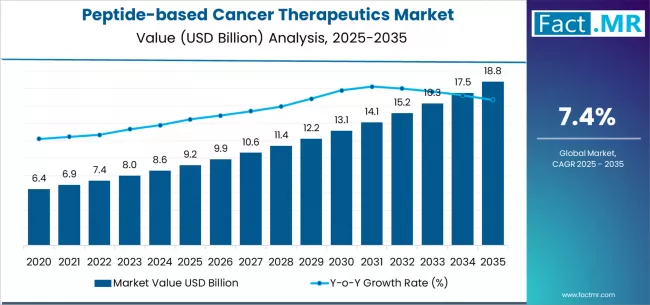
Between 2025 and 2030, the peptide-based cancer therapeutics market is projected to expand from USD 9.2 billion to USD 13.1 billion, resulting in a value increase of USD 3.9 billion, which represents 41.1% of the total forecast growth for the decade. This phase of development will be shaped by increasing cancer treatment demand recovery, rising precision medicine adoption, and growing implementation of targeted peptide therapies in oncology operations. Pharmaceutical manufacturers are expanding their development capabilities to address the growing demand for effective cancer treatments and enhanced patient outcomes.
Peptide-based Cancer Therapeutics Market Key Takeaways
| Metric | Value |
|---|---|
| Estimated Value in (2025E) | USD 9.2 billion |
| Forecast Value in (2035F) | USD 18.7 billion |
| Forecast CAGR (2025 to 2035) | 7.4% |
From 2030 to 2035, the market is forecast to grow from USD 13.1 billion to USD 18.7 billion, adding another USD 5.6 billion, which constitutes 58.9% of the overall ten-year expansion. This period is expected to be characterized by the expansion of personalized medicine systems, the integration of biomarker-guided therapies, and the development of combination treatment protocols for specialized cancer care. The growing adoption of precision oncology programs and companion diagnostic initiatives will drive demand for peptide-based cancer therapeutics with enhanced targeting capabilities and improved treatment efficacy.
Between 2020 and 2025, the peptide-based cancer therapeutics market experienced steady recovery growth, driven by increasing cancer research advancement and growing recognition of peptide therapeutics as essential treatment modality for targeted cancer therapy and patient outcome improvement. The market developed as oncologists and pharmaceutical companies recognized the potential for peptide-based drugs to enhance treatment specificity while reducing side effects and improving therapeutic effectiveness. Technological advancement in peptide synthesis and delivery systems began emphasizing the critical importance of maintaining treatment precision and operational efficiency in cancer care operations.
Why is the Peptide-based Cancer Therapeutics Market Growing?
Market expansion is being supported by the increasing global cancer burden and the corresponding need for targeted therapeutic options that can maintain treatment efficacy and patient safety while supporting diverse oncology applications across various healthcare environments. Modern oncologists and cancer care providers are increasingly focused on implementing therapeutic solutions that can improve patient outcomes, reduce treatment toxicity, and provide consistent performance in specialized cancer treatment settings. Peptide-based cancer therapeutics' proven ability to deliver enhanced targeting precision, reliable therapeutic capabilities, and versatile oncology applications make them essential treatments for contemporary cancer care operations and patient management solutions.
The growing emphasis on precision medicine modernization and personalized treatment is driving demand for peptide-based cancer therapeutics that can support specific cancer types, reduce treatment complications, and enable efficient therapy protocols across varying patient populations. Healthcare provider preference for treatments that combine efficacy with safety and personalization is creating opportunities for innovative therapeutic implementations. The rising influence of biomarker-guided therapy and companion diagnostics is also contributing to increased adoption of peptide-based cancer therapeutics that can provide advanced targeting capabilities without compromising performance or patient safety.
Opportunity Pathways - Peptide-based Cancer Therapeutics Market
The peptide-based cancer therapeutics market is poised for robust growth and transformation. As oncologists and cancer care providers across both developed and emerging markets seek therapeutic options that are targeted, effective, personalized, and safety-focused, peptide-based systems are gaining prominence not just as cancer treatments but as strategic solutions for patient outcome optimization, treatment precision enhancement, toxicity reduction, and therapy personalization.
Rising cancer incidence and precision medicine adoption in North America, Europe, and Asia Pacific amplify demand, while manufacturers are picking up on innovations in biomarker integration and combination therapies.
Pathways like personalized medicine, combination therapies, and biomarker-guided treatment promise strong margin uplift, especially in developed markets. Geographic expansion and indication diversification will capture volume, particularly where cancer care is advancing or oncology infrastructure requires modernization. Treatment outcome pressures around efficacy improvement, safety optimization, personalization enhancement, and resistance management give structural support.
- Pathway A - Personalized & Biomarker-Guided Therapies. Oncologists increasingly require treatments with companion diagnostics and biomarker selection capabilities. Pharmaceutical manufacturers who specialize in precision medicine or enhance biomarker integration can command a premium. Expected revenue pool: USD 2.5-3.2 billion
- Pathway B - Combination & Adjuvant Therapies. Advanced treatment systems -- immunotherapy combinations, targeted combinations, multi-modal approaches -- improve treatment outcomes and extend survival. Opportunity: USD 2.1-2.8 billion
- Pathway C - Novel Peptide Engineering. Advanced peptide design, improved stability, and enhanced delivery optimize therapeutic performance and patient convenience. Systems with stronger engineering capabilities will allow premium positioning. Revenue lift: USD 1.8-2.5 billion
- Pathway D - Specialized Cancer Applications. Extending reach into rare cancers, pediatric oncology, and resistant tumors. Cancer centers will look for therapeutic suppliers who provide innovative, effective treatment solutions. Pool: USD 2.0-2.7 billion
- Pathway E - Emerging Market Expansion. Strong growth in developing cancer markets, healthcare infrastructure development, and oncology capacity expansion. Local partnerships and access programs help penetration. Expected upside: USD 1.5-2.2 billion
- Pathway F - Comprehensive Patient Services. Patient support programs, adherence monitoring, and outcome tracking help optimize treatment effectiveness and patient experience. Service approaches benefit from long-term patient relationships. USD 1.2-1.9 billion
- Pathway G - Next-Generation Delivery Systems. Improved formulations, targeted delivery, and enhanced bioavailability create differentiation and efficacy advantages. Pool: USD 1.0-1.7 billion
Segmental Analysis
The market is segmented by class, indication, and line of therapy. By class, the market is divided into peptide hormone analogues, peptide-drug conjugates, and vaccines/others. By indication, it covers prostate & breast, neuroendocrine/GI, and melanoma/others. By line of therapy, it is segmented into 2L/3L, 1L, and adjuvant/others. Regionally, the market is divided into North America, Europe, Asia Pacific, Latin America, and Middle East & Africa.
By Class, the Peptide Hormone Analogues Segment Accounts for 46.0% Market Share
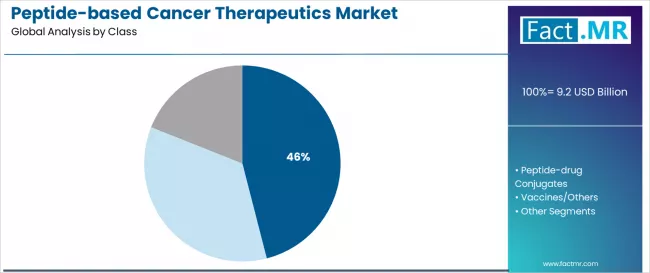
The peptide hormone analogues segment is projected to account for 46.0% of the peptide-based cancer therapeutics market in 2025, reaffirming its position as the leading therapeutic class category. Oncologists and cancer care providers increasingly utilize peptide hormone analogues for their proven efficacy, established clinical protocols, and targeted mechanism of action in hormone-sensitive cancers across prostate cancer treatment, breast cancer therapy, and neuroendocrine tumor management applications.
Peptide hormone analogue technology's established treatment procedures and consistent therapeutic output directly address the oncology requirements for hormone pathway targeting and cancer growth control in diverse patient populations. This class segment forms the foundation of current peptide-based cancer treatment, as it represents the therapeutic approach with the greatest clinical evidence and established usage infrastructure across multiple cancer types and treatment scenarios.
Pharmaceutical investments in enhanced analogue development and therapeutic optimization continue to strengthen adoption among oncologists and cancer centers. With providers prioritizing treatment efficacy and mechanism specificity, peptide hormone analogues align with both clinical effectiveness objectives and patient management requirements, making them the central component of comprehensive cancer therapy strategies.
By Indication, the Prostate & Breast Segment Accounts for 39.0% Market Share
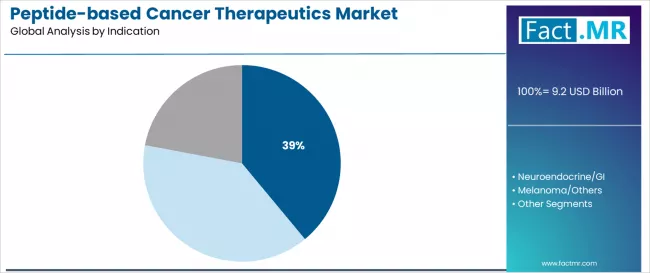
Prostate & breast cancer indications are projected to represent 39.0% of peptide-based cancer therapeutics utilization in 2025, underscoring their critical role as the primary cancer types for hormone-targeted therapy and gender-specific cancer treatment.
Oncologists prefer peptide-based therapeutics for prostate & breast cancers due to their hormone dependency, established treatment pathways, and ability to support comprehensive cancer management while maintaining treatment efficacy and patient outcome requirements. Positioned as essential therapy for modern gender-specific oncology, prostate & breast applications offer both clinical advantages and patient care benefits.
The segment is supported by continuous innovation in hormone-sensitive cancer treatment and the growing availability of specialized therapeutic configurations that enable effective cancer management with enhanced patient outcomes. Additionally, oncologists are investing in treatment optimization to support comprehensive cancer care and survival improvement.
As hormone-sensitive cancer awareness becomes more prevalent and treatment requirements increase, prostate & breast indications will continue to dominate the indication market while supporting advanced therapeutic protocols and patient care strategies.
By Line of Therapy, the 2L/3L Segment Accounts for 52.0% Market Share
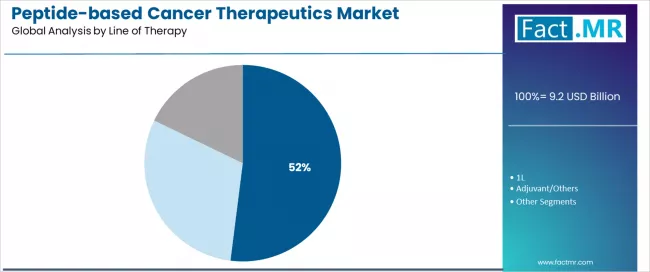
2L/3L therapies are projected to represent 52.0% of peptide-based cancer therapeutics usage in 2025, underscoring their critical role as the primary treatment setting for advanced cancer management and treatment-resistant cases.
Oncologists prefer peptide-based therapeutics for 2L/3L therapy due to their targeted mechanisms, established efficacy in resistant cancers, and ability to provide treatment options when first-line therapies fail while maintaining patient quality of life and treatment response potential. Positioned as essential treatments for advanced cancer care, 2L/3L applications offer both therapeutic advantages and patient hope benefits.
The segment is supported by continuous innovation in advanced cancer treatment and the growing availability of resistance-targeting configurations that enable effective management of progressive disease with enhanced survival outcomes.
Additionally, oncologists are investing in advanced therapy optimization to support patient outcomes and treatment sequence strategies. As cancer treatment resistance becomes more understood and advanced therapy requirements increase, 2L/3L applications will continue to dominate the therapy line market while supporting advanced cancer management and patient survival strategies.
What are the Drivers, Restraints, and Key Trends of the Peptide-based Cancer Therapeutics Market?
The peptide-based cancer therapeutics market is advancing steadily due to increasing cancer incidence rates and growing adoption of precision medicine infrastructure that provides enhanced treatment targeting and patient outcome optimization across diverse oncology applications.
However, the market faces challenges, including development costs, regulatory approval complexities, and varying treatment responses across different patient populations. Innovation in peptide engineering and combination therapies continues to influence therapeutic development and market expansion patterns.
Rising Global Cancer Incidence and Precision Medicine Adoption
The growing expansion of cancer cases and precision medicine awareness is enabling pharmaceutical manufacturers to develop peptide-based therapeutic systems that provide superior treatment targeting, enhanced patient outcomes, and reliable performance in specialized oncology environments.
Advanced therapeutic systems provide improved treatment capacity while allowing more effective cancer management and consistent survival outcomes across various applications and patient requirements. Manufacturers are increasingly recognizing the competitive advantages of modern therapeutic capabilities for clinical effectiveness and oncology practice positioning.
Biomarker Integration and Combination Therapy Drive Therapeutic Innovation
Modern peptide-based cancer therapeutic manufacturers are incorporating biomarker selection strategies and combination therapy approaches to enhance treatment precision, improve patient outcomes, and ensure consistent performance delivery to oncology stakeholders.
These approaches improve therapeutic effectiveness while enabling new applications, including personalized treatment protocols and resistance management solutions. Advanced therapeutic integration also allows manufacturers to support premium product positioning and clinical optimization beyond traditional cancer treatment supply.
Analysis of the Peptide-based Cancer Therapeutics Market by Key Countries
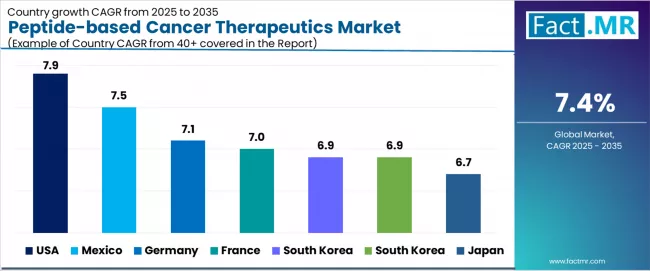
| Country | CAGR (2025-2035) |
|---|---|
| USA | 7.9% |
| Mexico | 7.5% |
| Germany | 7.1% |
| France | 7.0% |
| South Korea | 6.9% |
| United Kingdom | 6.9% |
| Japan | 6.7% |
The peptide-based cancer therapeutics market is experiencing strong growth globally, with the USA leading at a 7.9% CAGR through 2035, driven by extensive cancer research infrastructure, advanced precision medicine adoption, and significant implementation of biomarker-guided therapeutic solutions. Mexico follows at 7.5%, supported by growing cancer care investment, rapid oncology infrastructure development, and growing adoption of targeted therapeutic technologies.
Germany shows growth at 7.1%, emphasizing clinical excellence and advanced pharmaceutical capabilities. France records 7.0%, focusing on oncology innovation and precision medicine optimization. S
outh Korea and United Kingdom demonstrate 6.9% growth, supported by healthcare modernization and research advancement. Japan demonstrates 6.7% growth, supported by pharmaceutical innovation but constrained by regulatory complexities.
The report covers an in-depth analysis of 40+ countries; seven top-performing countries are highlighted below.
USA Leads Global Market Growth with Cancer Research Infrastructure
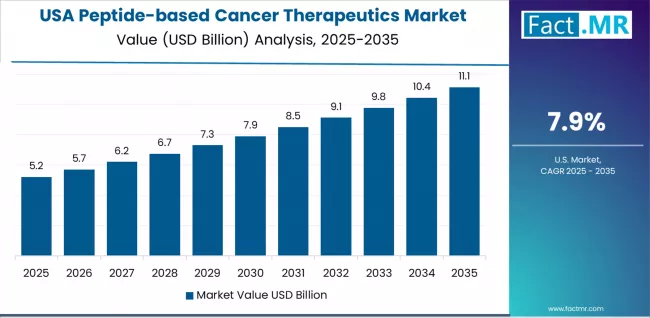
Revenue from peptide-based cancer therapeutics in the USA is projected to exhibit exceptional growth with a CAGR of 7.9% through 2035, driven by extensive cancer research infrastructure and rapidly growing adoption of precision medicine solutions supported by biomarker development and personalized therapy initiatives.
The country's comprehensive oncology ecosystem and increasing investment in targeted therapeutic technologies are creating substantial demand for advanced peptide-based solutions. Major cancer centers and pharmaceutical companies are establishing comprehensive development programs to serve both patient care operations and clinical research requirements.
- Strong pharmaceutical industry presence and cancer research leadership is driving demand for innovative therapeutic technologies throughout major oncology centers and research institutions.
- Robust precision medicine infrastructure and expanding network of specialized cancer centers are supporting the rapid adoption of targeted therapeutic technologies among providers seeking enhanced patient outcomes and treatment effectiveness.
Mexico Demonstrates Strong Market Potential with Oncology Infrastructure Expansion
Revenue from peptide-based cancer therapeutics in Mexico is expanding at a CAGR of 7.5%, supported by the country's growing cancer care investment, extensive oncology infrastructure development, and increasing adoption of targeted therapeutic systems.
The country's comprehensive healthcare modernization and expanding cancer treatment capabilities are driving sophisticated therapeutic requirements. Oncologists and pharmaceutical companies are establishing extensive treatment operations to address the growing demand for effective cancer therapies and patient outcome improvement.
- Rising healthcare infrastructure investment and expanding cancer care capabilities are creating opportunities for therapeutic adoption across hospitals, cancer centers, and specialty clinics in major metropolitan regions.
- Growing government focus on cancer care modernization and pharmaceutical access is driving adoption of advanced therapeutic technologies among providers seeking enhanced treatment capabilities and patient outcomes.
Europe Market Split by Countries
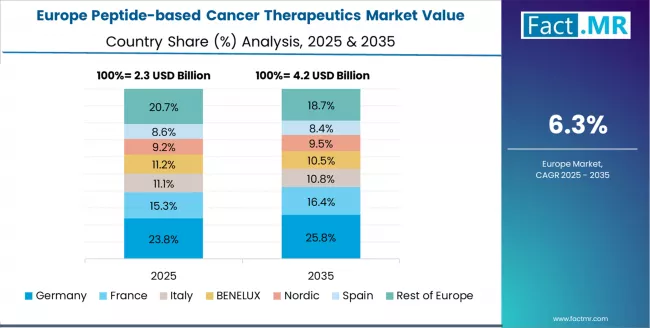
The peptide-based cancer therapeutics market in Europe is projected to grow from USD 2.8 billion in 2025 to USD 5.2 billion by 2035, registering a CAGR of 6.4% over the forecast period. Germany is expected to maintain its leadership position with a 27.9% market share in 2025, increasing to 28.6% by 2035, supported by advanced pharmaceutical infrastructure, comprehensive research capabilities, and major oncology centers serving European and international patients.
France follows with a 21.4% share in 2025, projected to ease to 20.9% by 2035, driven by oncology excellence programs, precision medicine initiatives, and established pharmaceutical capabilities, but facing challenges from competitive pressures and cost constraints. United Kingdom holds an 18.6% share in 2025, expected to decline to 18.2% by 2035, supported by cancer research requirements and therapeutic innovation but facing challenges from healthcare funding limitations.
Italy commands a 14.3% share in 2025, projected to reach 14.5% by 2035, while Spain accounts for 11.1% in 2025, expected to increase slightly to 11.3% by 2035. The Rest of Europe, including Nordic countries, Eastern European markets, Netherlands, Belgium, and other European countries, is anticipated to hold 6.7% in 2025, slightly declining to 6.5% by 2035, attributed to increasing cancer research development across Nordic countries and growing oncology modernization across various European markets implementing therapeutic enhancement programs.
Competitive Landscape of the Peptide-based Cancer Therapeutics Market
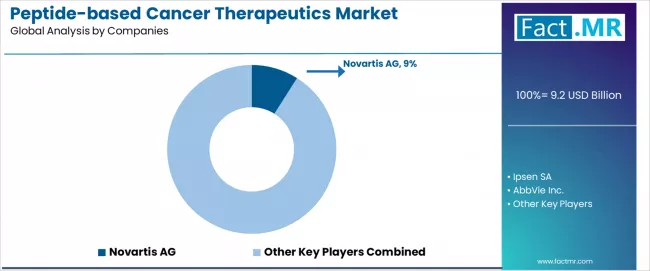
The peptide-based cancer therapeutics market is characterized by competition among established pharmaceutical giants, specialized biotechnology companies, and integrated oncology solution providers. Companies are investing in advanced peptide research, biomarker development, combination therapy studies, and comprehensive therapeutic portfolios to deliver targeted, effective, and clinically validated cancer treatment solutions. Innovation in peptide engineering, precision medicine integration, and combination therapy development is central to strengthening market position and competitive advantage.
Novartis leads the market with a 9.0% market share, offering comprehensive oncology portfolios with a focus on targeted therapies and precision medicine approaches for cancer treatment operations. Ipsen provides specialized peptide therapeutics with an emphasis on neuroendocrine tumors, clinical excellence, and European market leadership. AbbVie delivers diverse oncology treatments with a focus on innovative mechanisms and global pharmaceutical capabilities.
Amgen specializes in biotechnology solutions with emphasis on protein therapeutics and clinical effectiveness. AstraZeneca focuses on oncology innovation with global pharmaceutical leadership and precision medicine integration. BMS offers comprehensive cancer treatments with emphasis on immunotherapy combinations and clinical development. Takeda provides specialized oncology solutions with emphasis on rare cancer focus and international market capabilities.
Key Players in the Peptide-based Cancer Therapeutics Market
- Novartis AG
- Ipsen SA
- AbbVie Inc.
- Amgen Inc.
- AstraZeneca PLC
- Bristol Myers Squibb Company (BMS)
- Takeda Pharmaceutical Company Limited
- Merck & Co. Inc.
- Roche Holding AG
- Eli Lilly and Company
Scope of the Report
| Items | Values |
|---|---|
| Quantitative Units (2025) | USD 9.2 Billion |
| Class | Peptide hormone analogues, Peptide-drug conjugates, Vaccines/others |
| Indication | Prostate & breast, Neuroendocrine/GI, Melanoma/others |
| Line of Therapy | 2L/3L, 1L, Adjuvant/others |
| Regions Covered | North America, Europe, Asia Pacific, Latin America, Middle East & Africa |
| Countries Covered | United States, Canada, Germany, United Kingdom, France, China, Japan, Brazil, India and 40+ countries |
| Key Companies Profiled | Novartis, Ipsen, AbbVie, Amgen, AstraZeneca, BMS, and Takeda |
| Additional Attributes | Therapeutic sales by class and indication category, regional demand trends, competitive landscape, technological advancements in peptide systems, biomarker development, precision medicine innovation, and oncology integration optimization |
Peptide-based Cancer Therapeutics Market by Segments
-
Class :
- Peptide Hormone Analogues
- Peptide-drug Conjugates
- Vaccines/Others
-
Indication :
- Prostate & Breast
- Neuroendocrine/GI
- Melanoma/Others
-
Line of Therapy :
- 2L/3L
- 1L
- Adjuvant/Others
-
Region :
-
North America
- United States
- Canada
- Mexico
-
Europe
- Germany
- United Kingdom
- France
- Italy
- Spain
- Nordic
- BENELUX
- Rest of Europe
-
Asia Pacific
- China
- Japan
- India
- South Korea
- ASEAN
- Australia & New Zealand
- Rest of Asia Pacific
-
Latin America
- Brazil
- Chile
- Rest of Latin America
-
Middle East & Africa
- Kingdom of Saudi Arabia
- Other GCC Countries
- Turkey
- South Africa
- Other African Union
- Rest of Middle East & Africa
-
Table of Content
- Executive Summary
- Global Market Outlook
- Demand to side Trends
- Supply to side Trends
- Technology Roadmap Analysis
- Analysis and Recommendations
- Market Overview
- Market Coverage / Taxonomy
- Market Definition / Scope / Limitations
- Market Background
- Market Dynamics
- Drivers
- Restraints
- Opportunity
- Trends
- Scenario Forecast
- Demand in Optimistic Scenario
- Demand in Likely Scenario
- Demand in Conservative Scenario
- Opportunity Map Analysis
- Product Life Cycle Analysis
- Supply Chain Analysis
- Investment Feasibility Matrix
- Value Chain Analysis
- PESTLE and Porter’s Analysis
- Regulatory Landscape
- Regional Parent Market Outlook
- Production and Consumption Statistics
- Import and Export Statistics
- Market Dynamics
- Global Market Analysis 2020 to 2024 and Forecast, 2025 to 2035
- Historical Market Size Value (USD Million) Analysis, 2020 to 2024
- Current and Future Market Size Value (USD Million) Projections, 2025 to 2035
- Y to o to Y Growth Trend Analysis
- Absolute $ Opportunity Analysis
- Global Market Pricing Analysis 2020 to 2024 and Forecast 2025 to 2035
- Global Market Analysis 2020 to 2024 and Forecast 2025 to 2035, By Class
- Introduction / Key Findings
- Historical Market Size Value (USD Million) Analysis By Class , 2020 to 2024
- Current and Future Market Size Value (USD Million) Analysis and Forecast By Class , 2025 to 2035
- Peptide Hormone Analogues
- Peptide-drug Conjugates
- Vaccines/Others
- Y to o to Y Growth Trend Analysis By Class , 2020 to 2024
- Absolute $ Opportunity Analysis By Class , 2025 to 2035
- Global Market Analysis 2020 to 2024 and Forecast 2025 to 2035, By Indication
- Introduction / Key Findings
- Historical Market Size Value (USD Million) Analysis By Indication, 2020 to 2024
- Current and Future Market Size Value (USD Million) Analysis and Forecast By Indication, 2025 to 2035
- Prostate & Breast
- Neuroendocrine/GI
- Melanoma/Others
- Y to o to Y Growth Trend Analysis By Indication, 2020 to 2024
- Absolute $ Opportunity Analysis By Indication, 2025 to 2035
- Global Market Analysis 2020 to 2024 and Forecast 2025 to 2035, By Line of Therapy
- Introduction / Key Findings
- Historical Market Size Value (USD Million) Analysis By Line of Therapy, 2020 to 2024
- Current and Future Market Size Value (USD Million) Analysis and Forecast By Line of Therapy, 2025 to 2035
- 2L/3L
- 1L
- Adjuvant/Others
- Y to o to Y Growth Trend Analysis By Line of Therapy, 2020 to 2024
- Absolute $ Opportunity Analysis By Line of Therapy, 2025 to 2035
- Global Market Analysis 2020 to 2024 and Forecast 2025 to 2035, By Region
- Introduction
- Historical Market Size Value (USD Million) Analysis By Region, 2020 to 2024
- Current Market Size Value (USD Million) Analysis and Forecast By Region, 2025 to 2035
- North America
- Latin America
- Western Europe
- Eastern Europe
- East Asia
- South Asia and Pacific
- Middle East & Africa
- Market Attractiveness Analysis By Region
- North America Market Analysis 2020 to 2024 and Forecast 2025 to 2035, By Country
- Historical Market Size Value (USD Million) Trend Analysis By Market Taxonomy, 2020 to 2024
- Market Size Value (USD Million) Forecast By Market Taxonomy, 2025 to 2035
- By Country
- USA
- Canada
- Mexico
- By Class
- By Indication
- By Line of Therapy
- By Country
- Market Attractiveness Analysis
- By Country
- By Class
- By Indication
- By Line of Therapy
- Key Takeaways
- Latin America Market Analysis 2020 to 2024 and Forecast 2025 to 2035, By Country
- Historical Market Size Value (USD Million) Trend Analysis By Market Taxonomy, 2020 to 2024
- Market Size Value (USD Million) Forecast By Market Taxonomy, 2025 to 2035
- By Country
- Brazil
- Chile
- Rest of Latin America
- By Class
- By Indication
- By Line of Therapy
- By Country
- Market Attractiveness Analysis
- By Country
- By Class
- By Indication
- By Line of Therapy
- Key Takeaways
- Western Europe Market Analysis 2020 to 2024 and Forecast 2025 to 2035, By Country
- Historical Market Size Value (USD Million) Trend Analysis By Market Taxonomy, 2020 to 2024
- Market Size Value (USD Million) Forecast By Market Taxonomy, 2025 to 2035
- By Country
- Germany
- UK
- Italy
- Spain
- France
- Nordic
- BENELUX
- Rest of Western Europe
- By Class
- By Indication
- By Line of Therapy
- By Country
- Market Attractiveness Analysis
- By Country
- By Class
- By Indication
- By Line of Therapy
- Key Takeaways
- Eastern Europe Market Analysis 2020 to 2024 and Forecast 2025 to 2035, By Country
- Historical Market Size Value (USD Million) Trend Analysis By Market Taxonomy, 2020 to 2024
- Market Size Value (USD Million) Forecast By Market Taxonomy, 2025 to 2035
- By Country
- Russia
- Poland
- Hungary
- Balkan & Baltic
- Rest of Eastern Europe
- By Class
- By Indication
- By Line of Therapy
- By Country
- Market Attractiveness Analysis
- By Country
- By Class
- By Indication
- By Line of Therapy
- Key Takeaways
- East Asia Market Analysis 2020 to 2024 and Forecast 2025 to 2035, By Country
- Historical Market Size Value (USD Million) Trend Analysis By Market Taxonomy, 2020 to 2024
- Market Size Value (USD Million) Forecast By Market Taxonomy, 2025 to 2035
- By Country
- China
- Japan
- South Korea
- By Class
- By Indication
- By Line of Therapy
- By Country
- Market Attractiveness Analysis
- By Country
- By Class
- By Indication
- By Line of Therapy
- Key Takeaways
- South Asia and Pacific Market Analysis 2020 to 2024 and Forecast 2025 to 2035, By Country
- Historical Market Size Value (USD Million) Trend Analysis By Market Taxonomy, 2020 to 2024
- Market Size Value (USD Million) Forecast By Market Taxonomy, 2025 to 2035
- By Country
- India
- ASEAN
- Australia & New Zealand
- Rest of South Asia and Pacific
- By Class
- By Indication
- By Line of Therapy
- By Country
- Market Attractiveness Analysis
- By Country
- By Class
- By Indication
- By Line of Therapy
- Key Takeaways
- Middle East & Africa Market Analysis 2020 to 2024 and Forecast 2025 to 2035, By Country
- Historical Market Size Value (USD Million) Trend Analysis By Market Taxonomy, 2020 to 2024
- Market Size Value (USD Million) Forecast By Market Taxonomy, 2025 to 2035
- By Country
- Kingdom of Saudi Arabia
- Other GCC Countries
- Turkiye
- South Africa
- Other African Union
- Rest of Middle East & Africa
- By Class
- By Indication
- By Line of Therapy
- By Country
- Market Attractiveness Analysis
- By Country
- By Class
- By Indication
- By Line of Therapy
- Key Takeaways
- Key Countries Market Analysis
- USA
- Pricing Analysis
- Market Share Analysis, 2024
- By Class
- By Indication
- By Line of Therapy
- Canada
- Pricing Analysis
- Market Share Analysis, 2024
- By Class
- By Indication
- By Line of Therapy
- Mexico
- Pricing Analysis
- Market Share Analysis, 2024
- By Class
- By Indication
- By Line of Therapy
- Brazil
- Pricing Analysis
- Market Share Analysis, 2024
- By Class
- By Indication
- By Line of Therapy
- Chile
- Pricing Analysis
- Market Share Analysis, 2024
- By Class
- By Indication
- By Line of Therapy
- Germany
- Pricing Analysis
- Market Share Analysis, 2024
- By Class
- By Indication
- By Line of Therapy
- UK
- Pricing Analysis
- Market Share Analysis, 2024
- By Class
- By Indication
- By Line of Therapy
- Italy
- Pricing Analysis
- Market Share Analysis, 2024
- By Class
- By Indication
- By Line of Therapy
- Spain
- Pricing Analysis
- Market Share Analysis, 2024
- By Class
- By Indication
- By Line of Therapy
- France
- Pricing Analysis
- Market Share Analysis, 2024
- By Class
- By Indication
- By Line of Therapy
- India
- Pricing Analysis
- Market Share Analysis, 2024
- By Class
- By Indication
- By Line of Therapy
- ASEAN
- Pricing Analysis
- Market Share Analysis, 2024
- By Class
- By Indication
- By Line of Therapy
- Australia & New Zealand
- Pricing Analysis
- Market Share Analysis, 2024
- By Class
- By Indication
- By Line of Therapy
- China
- Pricing Analysis
- Market Share Analysis, 2024
- By Class
- By Indication
- By Line of Therapy
- Japan
- Pricing Analysis
- Market Share Analysis, 2024
- By Class
- By Indication
- By Line of Therapy
- South Korea
- Pricing Analysis
- Market Share Analysis, 2024
- By Class
- By Indication
- By Line of Therapy
- Russia
- Pricing Analysis
- Market Share Analysis, 2024
- By Class
- By Indication
- By Line of Therapy
- Poland
- Pricing Analysis
- Market Share Analysis, 2024
- By Class
- By Indication
- By Line of Therapy
- Hungary
- Pricing Analysis
- Market Share Analysis, 2024
- By Class
- By Indication
- By Line of Therapy
- Kingdom of Saudi Arabia
- Pricing Analysis
- Market Share Analysis, 2024
- By Class
- By Indication
- By Line of Therapy
- Turkiye
- Pricing Analysis
- Market Share Analysis, 2024
- By Class
- By Indication
- By Line of Therapy
- South Africa
- Pricing Analysis
- Market Share Analysis, 2024
- By Class
- By Indication
- By Line of Therapy
- USA
- Market Structure Analysis
- Competition Dashboard
- Competition Benchmarking
- Market Share Analysis of Top Players
- By Regional
- By Class
- By Indication
- By Line of Therapy
- Competition Analysis
- Competition Deep Dive
- Novartis AG
- Overview
- Product Portfolio
- Profitability by Market Segments (Product/Age /Sales Channel/Region)
- Sales Footprint
- Strategy Overview
- Marketing Strategy
- Product Strategy
- Channel Strategy
- Ipsen SA
- AbbVie Inc.
- Amgen Inc.
- AstraZeneca PLC
- Bristol Myers Squibb Company (BMS)
- Takeda Pharmaceutical Company Limited
- Merck & Co., Inc.
- Roche Holding AG
- Eli Lilly and Company
- Novartis AG
- Competition Deep Dive
- Assumptions & Acronyms Used
- Research Methodology
List Of Table
- Table 1: Global Market Value (USD Million) Forecast by Region, 2020 to 2035
- Table 2: Global Market Value (USD Million) Forecast by Class , 2020 to 2035
- Table 3: Global Market Value (USD Million) Forecast by Indication, 2020 to 2035
- Table 4: Global Market Value (USD Million) Forecast by Line of Therapy, 2020 to 2035
- Table 5: North America Market Value (USD Million) Forecast by Country, 2020 to 2035
- Table 6: North America Market Value (USD Million) Forecast by Class , 2020 to 2035
- Table 7: North America Market Value (USD Million) Forecast by Indication, 2020 to 2035
- Table 8: North America Market Value (USD Million) Forecast by Line of Therapy, 2020 to 2035
- Table 9: Latin America Market Value (USD Million) Forecast by Country, 2020 to 2035
- Table 10: Latin America Market Value (USD Million) Forecast by Class , 2020 to 2035
- Table 11: Latin America Market Value (USD Million) Forecast by Indication, 2020 to 2035
- Table 12: Latin America Market Value (USD Million) Forecast by Line of Therapy, 2020 to 2035
- Table 13: Western Europe Market Value (USD Million) Forecast by Country, 2020 to 2035
- Table 14: Western Europe Market Value (USD Million) Forecast by Class , 2020 to 2035
- Table 15: Western Europe Market Value (USD Million) Forecast by Indication, 2020 to 2035
- Table 16: Western Europe Market Value (USD Million) Forecast by Line of Therapy, 2020 to 2035
- Table 17: Eastern Europe Market Value (USD Million) Forecast by Country, 2020 to 2035
- Table 18: Eastern Europe Market Value (USD Million) Forecast by Class , 2020 to 2035
- Table 19: Eastern Europe Market Value (USD Million) Forecast by Indication, 2020 to 2035
- Table 20: Eastern Europe Market Value (USD Million) Forecast by Line of Therapy, 2020 to 2035
- Table 21: East Asia Market Value (USD Million) Forecast by Country, 2020 to 2035
- Table 22: East Asia Market Value (USD Million) Forecast by Class , 2020 to 2035
- Table 23: East Asia Market Value (USD Million) Forecast by Indication, 2020 to 2035
- Table 24: East Asia Market Value (USD Million) Forecast by Line of Therapy, 2020 to 2035
- Table 25: South Asia and Pacific Market Value (USD Million) Forecast by Country, 2020 to 2035
- Table 26: South Asia and Pacific Market Value (USD Million) Forecast by Class , 2020 to 2035
- Table 27: South Asia and Pacific Market Value (USD Million) Forecast by Indication, 2020 to 2035
- Table 28: South Asia and Pacific Market Value (USD Million) Forecast by Line of Therapy, 2020 to 2035
- Table 29: Middle East & Africa Market Value (USD Million) Forecast by Country, 2020 to 2035
- Table 30: Middle East & Africa Market Value (USD Million) Forecast by Class , 2020 to 2035
- Table 31: Middle East & Africa Market Value (USD Million) Forecast by Indication, 2020 to 2035
- Table 32: Middle East & Africa Market Value (USD Million) Forecast by Line of Therapy, 2020 to 2035
List Of Figures
- Figure 1: Global Market Pricing Analysis
- Figure 2: Global Market Value (USD Million) Forecast 2020-2035
- Figure 3: Global Market Value Share and BPS Analysis by Class , 2025 and 2035
- Figure 4: Global Market Y to o to Y Growth Comparison by Class , 2025-2035
- Figure 5: Global Market Attractiveness Analysis by Class
- Figure 6: Global Market Value Share and BPS Analysis by Indication, 2025 and 2035
- Figure 7: Global Market Y to o to Y Growth Comparison by Indication, 2025-2035
- Figure 8: Global Market Attractiveness Analysis by Indication
- Figure 9: Global Market Value Share and BPS Analysis by Line of Therapy, 2025 and 2035
- Figure 10: Global Market Y to o to Y Growth Comparison by Line of Therapy, 2025-2035
- Figure 11: Global Market Attractiveness Analysis by Line of Therapy
- Figure 12: Global Market Value (USD Million) Share and BPS Analysis by Region, 2025 and 2035
- Figure 13: Global Market Y to o to Y Growth Comparison by Region, 2025-2035
- Figure 14: Global Market Attractiveness Analysis by Region
- Figure 15: North America Market Incremental Dollar Opportunity, 2025-2035
- Figure 16: Latin America Market Incremental Dollar Opportunity, 2025-2035
- Figure 17: Western Europe Market Incremental Dollar Opportunity, 2025-2035
- Figure 18: Eastern Europe Market Incremental Dollar Opportunity, 2025-2035
- Figure 19: East Asia Market Incremental Dollar Opportunity, 2025-2035
- Figure 20: South Asia and Pacific Market Incremental Dollar Opportunity, 2025-2035
- Figure 21: Middle East & Africa Market Incremental Dollar Opportunity, 2025-2035
- Figure 22: North America Market Value Share and BPS Analysis by Country, 2025 and 2035
- Figure 23: North America Market Value Share and BPS Analysis by Class , 2025 and 2035
- Figure 24: North America Market Y to o to Y Growth Comparison by Class , 2025-2035
- Figure 25: North America Market Attractiveness Analysis by Class
- Figure 26: North America Market Value Share and BPS Analysis by Indication, 2025 and 2035
- Figure 27: North America Market Y to o to Y Growth Comparison by Indication, 2025-2035
- Figure 28: North America Market Attractiveness Analysis by Indication
- Figure 29: North America Market Value Share and BPS Analysis by Line of Therapy, 2025 and 2035
- Figure 30: North America Market Y to o to Y Growth Comparison by Line of Therapy, 2025-2035
- Figure 31: North America Market Attractiveness Analysis by Line of Therapy
- Figure 32: Latin America Market Value Share and BPS Analysis by Country, 2025 and 2035
- Figure 33: Latin America Market Value Share and BPS Analysis by Class , 2025 and 2035
- Figure 34: Latin America Market Y to o to Y Growth Comparison by Class , 2025-2035
- Figure 35: Latin America Market Attractiveness Analysis by Class
- Figure 36: Latin America Market Value Share and BPS Analysis by Indication, 2025 and 2035
- Figure 37: Latin America Market Y to o to Y Growth Comparison by Indication, 2025-2035
- Figure 38: Latin America Market Attractiveness Analysis by Indication
- Figure 39: Latin America Market Value Share and BPS Analysis by Line of Therapy, 2025 and 2035
- Figure 40: Latin America Market Y to o to Y Growth Comparison by Line of Therapy, 2025-2035
- Figure 41: Latin America Market Attractiveness Analysis by Line of Therapy
- Figure 42: Western Europe Market Value Share and BPS Analysis by Country, 2025 and 2035
- Figure 43: Western Europe Market Value Share and BPS Analysis by Class , 2025 and 2035
- Figure 44: Western Europe Market Y to o to Y Growth Comparison by Class , 2025-2035
- Figure 45: Western Europe Market Attractiveness Analysis by Class
- Figure 46: Western Europe Market Value Share and BPS Analysis by Indication, 2025 and 2035
- Figure 47: Western Europe Market Y to o to Y Growth Comparison by Indication, 2025-2035
- Figure 48: Western Europe Market Attractiveness Analysis by Indication
- Figure 49: Western Europe Market Value Share and BPS Analysis by Line of Therapy, 2025 and 2035
- Figure 50: Western Europe Market Y to o to Y Growth Comparison by Line of Therapy, 2025-2035
- Figure 51: Western Europe Market Attractiveness Analysis by Line of Therapy
- Figure 52: Eastern Europe Market Value Share and BPS Analysis by Country, 2025 and 2035
- Figure 53: Eastern Europe Market Value Share and BPS Analysis by Class , 2025 and 2035
- Figure 54: Eastern Europe Market Y to o to Y Growth Comparison by Class , 2025-2035
- Figure 55: Eastern Europe Market Attractiveness Analysis by Class
- Figure 56: Eastern Europe Market Value Share and BPS Analysis by Indication, 2025 and 2035
- Figure 57: Eastern Europe Market Y to o to Y Growth Comparison by Indication, 2025-2035
- Figure 58: Eastern Europe Market Attractiveness Analysis by Indication
- Figure 59: Eastern Europe Market Value Share and BPS Analysis by Line of Therapy, 2025 and 2035
- Figure 60: Eastern Europe Market Y to o to Y Growth Comparison by Line of Therapy, 2025-2035
- Figure 61: Eastern Europe Market Attractiveness Analysis by Line of Therapy
- Figure 62: East Asia Market Value Share and BPS Analysis by Country, 2025 and 2035
- Figure 63: East Asia Market Value Share and BPS Analysis by Class , 2025 and 2035
- Figure 64: East Asia Market Y to o to Y Growth Comparison by Class , 2025-2035
- Figure 65: East Asia Market Attractiveness Analysis by Class
- Figure 66: East Asia Market Value Share and BPS Analysis by Indication, 2025 and 2035
- Figure 67: East Asia Market Y to o to Y Growth Comparison by Indication, 2025-2035
- Figure 68: East Asia Market Attractiveness Analysis by Indication
- Figure 69: East Asia Market Value Share and BPS Analysis by Line of Therapy, 2025 and 2035
- Figure 70: East Asia Market Y to o to Y Growth Comparison by Line of Therapy, 2025-2035
- Figure 71: East Asia Market Attractiveness Analysis by Line of Therapy
- Figure 72: South Asia and Pacific Market Value Share and BPS Analysis by Country, 2025 and 2035
- Figure 73: South Asia and Pacific Market Value Share and BPS Analysis by Class , 2025 and 2035
- Figure 74: South Asia and Pacific Market Y to o to Y Growth Comparison by Class , 2025-2035
- Figure 75: South Asia and Pacific Market Attractiveness Analysis by Class
- Figure 76: South Asia and Pacific Market Value Share and BPS Analysis by Indication, 2025 and 2035
- Figure 77: South Asia and Pacific Market Y to o to Y Growth Comparison by Indication, 2025-2035
- Figure 78: South Asia and Pacific Market Attractiveness Analysis by Indication
- Figure 79: South Asia and Pacific Market Value Share and BPS Analysis by Line of Therapy, 2025 and 2035
- Figure 80: South Asia and Pacific Market Y to o to Y Growth Comparison by Line of Therapy, 2025-2035
- Figure 81: South Asia and Pacific Market Attractiveness Analysis by Line of Therapy
- Figure 82: Middle East & Africa Market Value Share and BPS Analysis by Country, 2025 and 2035
- Figure 83: Middle East & Africa Market Value Share and BPS Analysis by Class , 2025 and 2035
- Figure 84: Middle East & Africa Market Y to o to Y Growth Comparison by Class , 2025-2035
- Figure 85: Middle East & Africa Market Attractiveness Analysis by Class
- Figure 86: Middle East & Africa Market Value Share and BPS Analysis by Indication, 2025 and 2035
- Figure 87: Middle East & Africa Market Y to o to Y Growth Comparison by Indication, 2025-2035
- Figure 88: Middle East & Africa Market Attractiveness Analysis by Indication
- Figure 89: Middle East & Africa Market Value Share and BPS Analysis by Line of Therapy, 2025 and 2035
- Figure 90: Middle East & Africa Market Y to o to Y Growth Comparison by Line of Therapy, 2025-2035
- Figure 91: Middle East & Africa Market Attractiveness Analysis by Line of Therapy
- Figure 92: Global Market - Tier Structure Analysis
- Figure 93: Global Market - Company Share Analysis
- FAQs -
How big is the peptide-based cancer therapeutics market in 2025?
The global peptide-based cancer therapeutics market is estimated to be valued at USD 9.2 billion in 2025.
What will be the size of peptide-based cancer therapeutics market in 2035?
The market size for the peptide-based cancer therapeutics market is projected to reach USD 18.8 billion by 2035.
How much will be the peptide-based cancer therapeutics market growth between 2025 and 2035?
The peptide-based cancer therapeutics market is expected to grow at a 7.4% CAGR between 2025 and 2035.
What are the key product types in the peptide-based cancer therapeutics market?
The key product types in peptide-based cancer therapeutics market are peptide hormone analogues, peptide-drug conjugates and vaccines/others.
Which indication segment to contribute significant share in the peptide-based cancer therapeutics market in 2025?
In terms of indication, prostate & breast segment to command 39.0% share in the peptide-based cancer therapeutics market in 2025.